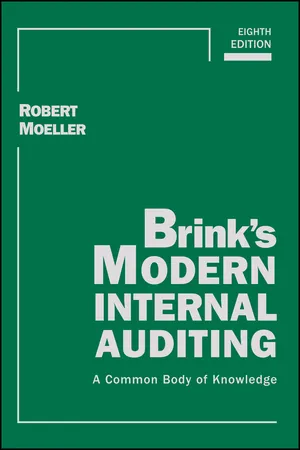
- English
- ePUB (mobile friendly)
- Available on iOS & Android
About this book
The complete guide to internal auditing for the modern world
Brink's Modern Internal Auditing: A Common Body of Knowledge, Eighth Edition covers the fundamental information that you need to make your role as internal auditor effective, efficient, and accurate. Originally written by one of the founders of internal auditing, Vic Brink and now fully updated and revised by internal controls and IT specialist, Robert Moeller, this new edition reflects the latest industry changes and legal revisions. This comprehensive resource has long been—and will continue to be—a critical reference for both new and seasoned internal auditors alike. Through the information provided in this inclusive text, you explore how to maximize your impact on your company by creating higher standards of professional conduct and greater protection against inefficiency, misconduct, illegal activity, and fraud.
A key feature of this book is a detailed description of an internal audit Common Body of Knowledge (CBOK), key governance; risk and compliance topics that all internal auditors need to know and understand. There are informative discussions on how to plan and perform internal audits including the information technology (IT) security and control issues that impact all enterprises today. Modern internal auditing is presented as a standard-setting branch of business that elevates professional conduct and protects entities against fraud, misconduct, illegal activity, inefficiency, and other issues that could detract from success.
- Contribute to your company's productivity and responsible resource allocation through targeted auditing practices
- Ensure that internal control procedures are in place, are working, and are leveraged as needed to support your company's performance
- Access fully-updated information regarding the latest changes in the internal audit industry
- Rely upon a trusted reference for insight into key topics regarding the internal audit field
Brink's Modern Internal Auditing: A Common Body of Knowledge, Eighth Edition presents the comprehensive collection of information that internal auditors rely on to remain effective in their role.
Frequently asked questions
- Essential is ideal for learners and professionals who enjoy exploring a wide range of subjects. Access the Essential Library with 800,000+ trusted titles and best-sellers across business, personal growth, and the humanities. Includes unlimited reading time and Standard Read Aloud voice.
- Complete: Perfect for advanced learners and researchers needing full, unrestricted access. Unlock 1.4M+ books across hundreds of subjects, including academic and specialized titles. The Complete Plan also includes advanced features like Premium Read Aloud and Research Assistant.
Please note we cannot support devices running on iOS 13 and Android 7 or earlier. Learn more about using the app.
Information
Part 1
Foundations of Modern Internal Auditing
CHAPTER 1
Significance of Internal Auditing in Enterprises Today: An Update
Internal auditing is an independent appraisal function established within an organization to examine and evaluate its activities as a service to the organization.
- Independent is used for auditing that is free of restrictions that could significantly limit the scope and effectiveness of any internal auditor review or the later reporting of resultant findings and conclusions.
- Appraisal confirms the need for an evaluation that is the thrust of internal auditors as they develop their conclusions.
- Established confirms that internal audit is a formal, definitive function in the modern enterprise.
- Examine and evaluate describe the active roles of internal auditors, first for fact-finding inquiries and then for judgmental evaluations.
- Its activities confirm the broad jurisdictional scope of internal audit work that applies to all of the processes and activities of the modern enterprise.
- Service reveals that the help and assistance to the audit committee, management, and other members of the enterprise are the end products of all internal auditing work.
- To the organization confirms that internal audit’s total service scope pertains to the entire enterprise, including all personnel, the board of directors, and their audit committee, stockholders, and other stakeholders.
1.1 Internal Auditing History and Background
Table of contents
- Cover
- Series
- Titlepage
- Copyright
- Dedication
- Preface
- Part 1: Foundations of Modern Internal Auditing
- Part 2: Importance of Internal Controls
- Part 3: Planning and Performing Internal Audits
- Part 4: Organizing and Managing Internal Audit Activities
- Part 5: Impact of Information Systems on Internal Auditing
- Part 6: Internal Audit and Enterprise Governance
- Part 7: The Professional Internal Auditor
- Part 8: The Other Sides of Auditing: Professional Convergence
- About the Author
- Index
- EULA